Green Office Spaces
 Below, you’ll find some helpful tips for designing a green office space to reduce waste and save energy and money. But did you know? You can also get credit for “greening” your office or business, and even be eligible for grant funding by becoming Green Business Certified! Click here for more information about obtaining a certification from the Green Business Program of Santa Barbara County, and for their guidance on purchasing sustainable products.
Below, you’ll find some helpful tips for designing a green office space to reduce waste and save energy and money. But did you know? You can also get credit for “greening” your office or business, and even be eligible for grant funding by becoming Green Business Certified! Click here for more information about obtaining a certification from the Green Business Program of Santa Barbara County, and for their guidance on purchasing sustainable products.
The Santa Barbara County Resource Recovery and Waste Management Division partners with the California Green Business Program to help support local businesses’ sustainability efforts. The County is not affiliated with the products recommended by the Green Business Program. Please see guidelines below for tips on making your own environmentally-friendly purchasing decisions.
Why Sustainable Purchasing Matters
Making eco-conscious purchasing decisions is essential for protecting our environment and creating a more sustainable future. By choosing sustainable products, you can reduce waste, keep unnecessary materials out of landfills, and support a circular economy.
Opting for energy-efficient appliances and durable goods can also save money over time by lowering energy bills and reducing the need for frequent replacements.
Additionally, selecting products that conserve natural resources, water, and energy helps lower greenhouse gas emissions, minimize pollution, and reduce solid waste. This is because reusable, recyclable, compostable, or recycled-content items decrease overall demand for virgin resources, while energy-efficient appliances and low-impact cleaning and building materials help reduce harmful emissions and exposure to toxins.
By integrating these environmentally preferred product choices into your purchasing decisions, you can reduce waste, lower greenhouse gas emissions, and create a healthier, more sustainable office environment.
Sustainable Purchasing Cheat Sheet
Below is a quick-reference guide for making sustainable purchasing decisions for your office or home:
Paper Products
- Opt for 100% recycled or FSC-certified paper to reduce deforestation (see Green Certifications section below for more information).
- Examples: printer paper, toilet paper, facial tissue, toilet seat covers, etc.
- Transition to digital processes whenever possible to minimize paper use.
Cleaning Supplies
- Use non-toxic, biodegradable cleaning products to reduce exposure to harmful chemicals.
- Avoid single-use cleaning wipes; instead, choose washable and reusable options such as Swedish dishcloths or cotton towels.
- Select janitorial supplies like hand soap, sanitizers, and paper products that meet eco-label standards (Green Seal, Safer Choice, etc. See Green Certifications section below for more information). Choose recyclable or refillable packaging options whenever possible.
Office Supplies
- Purchase pens, markers, and notebooks made from recycled materials.
- Invest in refillable pens and markers to cut down on waste.
- Choose letterhead, business cards, and envelopes made from recycled content.
Furniture and Electronics
- Consider refurbished or second-hand furniture and electronics to support waste diversion.
- Look for certifications like EPEAT, GREENGUARD, and Energy Star for electronics.
- Invest in EnergyStar appliances and energy-efficient lighting to lower energy consumption.
Additional Categories to Explore
- Fleet: Use re-refined antifreeze, oils, and renewable fuels.
- Construction: Prioritize recycled-content materials (e.g., carpet, concrete, tile).
- Landscaping: Opt for native or drought-tolerant plants, compost, and mulch.
- Water Systems: Install filtration systems and efficient fixtures to eliminate bottled water use.
Breakroom:
- Coffee Pods: Choose refillable coffee pods instead of single-use plastic or aluminum ones, or switch to using a filtered coffee machine, drip, or french press.
- Beverage Options: Provide bulk ground coffee, loose-leaf tea, and sugar dispensers to minimize single-use packaging waste.
- Reusable Dishware: Encourage the use of reusable mugs, plates, and utensils instead of disposables.
- Food Waste Reduction: Encourage coworkers to share or take home leftovers from potluck events to minimize food waste. If you’re located in the unincorporated Lompoc or Santa Maria Valleys (including Vandenberg Village, Los Alamos, and Orcutt), consider providing a kitchen pail to collect food scraps in and adding green waste service to your waste account to make composting food scraps and coffee grounds easy and accessible. Kitchen pails are FREE to County residents and offices and can be picked up at 620 W. Foster Rd., Santa Maria (the County Public Works office) Monday-Friday, 8am-noon and 1-5pm.
- Refrigerator Efficiency: Ensure the breakroom refrigerator and other appliances are ENERGY STAR certified and regularly maintained for efficiency.
- Filtered Water Systems: Install a water filtration system to eliminate the need for bottled water.
Reuse Before You Buy
- Office Supply Swap Programs
Is your workplace a good candidate for an office supply swap program? Consider partnering with other businesses in your building or neighborhood, or starting a swap program within your professional associations or groups. Contact Us for more info!
- Encourage Reuse
Depending on the size of your office or business, it may make sense to consider setting up a swap spot for employees to drop usable items they no longer need for other employees to take. Encourage them to check this area before purchasing new items. Consider allowing employee purchases from second-hand sources such as local thrift stores or eBay to cut down on the amount of items purchased new.
Materials
Oftentimes, it can be as easy as checking which materials a product was made with to know if it’s a sustainable alternative or not. Here are some examples of sustainable material swaps:
- Polyester, acrylic, or nylon —> Biodegradable materials such as cotton, linen, leather, wool, hemp, or bamboo.
- Examples: Staff shirts, kitchen/work rags, tote bags, dish scrubbers, etc.
- Tip: Be aware of fiber contents and tricky marketing. Oftentimes, items will be marketed as being made of wool or cotton, but the fiber content tag shows that they’re mostly synthetic with only a small portion of natural fibers. Always check the labels to be sure!
- Plastic —> Metal, ceramic or glass.
- Examples: Reusable or to-go bottles, cups, and dishware.
- Plastic-lined disposable dishware —> PLA-lined (usually BPI certified) disposable dishware, when necessary.
- Example: Disposable paper plates, bowls or cups.*
*Please note: only PLA-lined paper items can be composted in our municipal waste system. “Compostable plastic” items such as PLA utensils or cups are not compostable and will be sent to landfill as trash.
Durability
Buying one of something you can use for a long time will almost always be more sustainable than buying 100 single-use versions of the same thing! When making purchasing decisions, consider an item’s durability over time. Great examples of this include metal or wood kitchen utensils instead of plastic ones, or reusable metal water bottles or mugs instead of disposable plastic or even reusable plastic bottles.
Much of the plastic items we use every day are made from plastics that are difficult if not impossible to recycle, which means they usually end up in a landfill at the end of their usefulness. However, metal and glass are infinitely recyclable!
Green Certifications
Certifications are a great way to know a product or company has been vetted by professionals to adhere to certain environmental, ethical, and/or social standards. Here are some common certification labels to look out for when sourcing sustainable products:
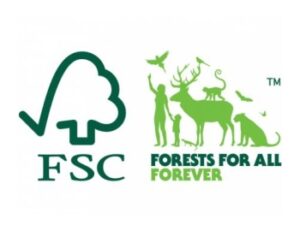
FSC: Forest Stewardship Council Certification for Sustainable Wood and Paper
The Forest Stewardship Council (FSC) is a trusted certification that ensures wood, paper, and other forest-based products come from responsibly managed forests. Their responsible forestry standards include zero deforestation, safeguarding of ancient and endangered forests, fair wage and work environment, biodiversity preservation, and community rights, including the rights of Indigenous Peoples.
You’ll often find the FSC label on products like:
- Office paper and notebooks
- Paper packaging and tissue products
- Wood furniture (like desks and chairs)
- Lumber and flooring
- Greeting cards and books
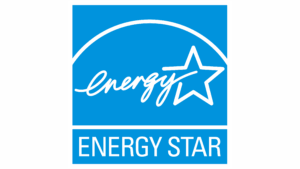
ENERGY STAR: Certified Energy-Efficient Products from the EPA
Products with the ENERGY STAR label meet strict efficiency guidelines set by the U.S. Environmental Protection Agency (EPA), meaning they use less energy, lower utility bills, and help protect the environment. Since 1992, ENERGY STAR and its partners have helped prevent 4 billion metric tons of greenhouse gas emissions from entering our atmosphere. In 2020 alone, the program’s emissions reductions were equivalent to more than five percent of U.S. total greenhouse gas emissions.
Examples of ENERGY STAR–certified products include:
- Refrigerators, dishwashers, and washing machines
- Air conditioners and heat pumps
- Light bulbs and fixtures, including LED bulbs
- Televisions and computers
- Ceiling fans and smart thermostats
- Commercial kitchen equipment
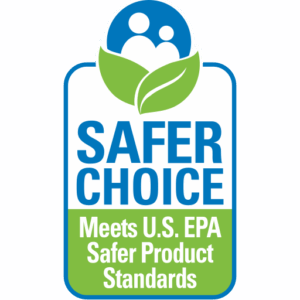
Safer Choice: EPA-Certified Products Made with Safer Ingredients
Products that carry the Safer Choice label have been carefully evaluated by EPA scientists. Every ingredient must meet strict safety criteria for both human health and the environment, including carcinogenicity, reproductive/developmental toxicity, toxicity to aquatic life, and persistence in the environment. Products made with safer chemicals also can improve indoor air quality because fumes from cleaning products can linger long after they have been applied, which can aggravate asthma and other respiratory conditions. Examples of products that carry the Safer Choice label include:
- Laundry detergents and fabric softeners
- All-purpose cleaners
- Dishwashing liquids and automatic dishwasher detergents
- Degreasers and kitchen surface cleaners
- Carpet and upholstery cleaners
- Floor care products
- Bathroom and glass cleaners
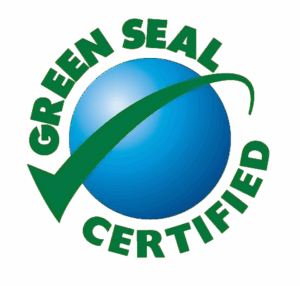
Green Seal: Rigorous Certification for Cleaning and Paper Products
The Green Seal label means the product has been independently tested and proven to perform well while reducing harmful impacts to people and the planet. Green Seal focuses on using safer chemicals to protect air quality and reduce asthma triggers, responsible sourcing to reduce CO2 emissions, prioritizing recycled content in their paper products, and minimizing plastic packaging.
Examples of Green Seal–certified products include:
- Multipurpose and bathroom cleaners
- Hand soaps and sanitizers
- Recycled-content paper towels and toilet paper
- Paints, coatings, and adhesives with low VOCs
- Floor care products
- Hotel and lodging operations that meet rigorous sustainability standards
These products and services are commonly found in schools, offices, hospitality settings, and green-certified businesses.
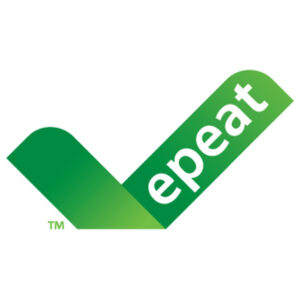
EPEAT: Electronic Product Environmental Assessment Tool
EPEAT is a global ecolabel for electronics managed by the Global Electronics Council. It helps identify electronic products that have a reduced environmental impact across their entire lifecycle—from design and production to energy use and end-of-life disposal. EPEAT-registered products are evaluated on criteria such as energy efficiency, reduction of toxic materials, recyclability, use of recycled content, and corporate responsibility practices.
The EPEAT label can be found on:
-
Desktop computers and laptops
-
Computer monitors and displays
-
Servers and imaging equipment (like printers and copiers)
-
Mobile phones and other communication devices
-
Televisions and networking equipment
EPEAT-certified products are especially useful in office, education, and IT procurement settings where reducing energy consumption and environmental impact are a priority.
Guides for Sustainable Purchases
Below you will find the Green Business Program’s guides on purchasing paper and cleaning products. Please note that these guides are updated and managed solely by the California Green Business Network and are not a comprehensive list of all sustainable paper or cleaning products available for sale. These guides are not vetted or endorsed by the County of Santa Barbara.
- Paper Purchasing Guide: Tips on choosing recycled and eco-friendly options.
- Cleaning Product Guide: Criteria for selecting green cleaning supplies.
For questions or concerns regarding these purchasing guides, please contact the Santa Barbara Green Business Program’s sustainability consultant Kori Nielsen at knielsen@environmentalin.com.
End-Of-Life Resources for Products
Waste happens. We get it! Just make sure you are participating in your local waste management programs to ensure your materials are disposed of safely and with the environment in mind.
Check out these pages for more information on the County’s business-centric programs, below.
Please note that these programs are specifically catered to commercial waste generation. These are similar, but not exactly the same as their resident-focused counterparts. Some of these options are not available to residents.
- Business Organic Waste Collection
- Business Hazardous Waste Collection
- Business Electronic Waste Collection
Interested in Getting Certified?
Office certification programs, like the Green Business Program of Santa Barbara County (GBPSBC), offer a valuable opportunity for your office to demonstrate environmental responsibility and commitment to sustainability. The certification process includes steps such as completing assessments, making sustainable upgrades—including eco-conscious purchasing—and implementing best practices to conserve resources. By getting certified, your office can enjoy benefits such as increased marketing opportunities, public recognition, and a tangible impact on environmental conservation.
The GBPSBC provides resources, assistance, and evaluations to businesses in cities like Carpinteria, Santa Barbara, Goleta, Buellton, Solvang, Lompoc, Santa Maria, and Guadalupe, and the County’s unincorporated areas. Participating businesses gain access to tools that help them operate sustainably while saving money and gaining certification. Certification, which is valid for four years, may require upfront costs for necessary upgrades but comes with the long-term benefits of improved resource efficiency and enhanced credibility as an environmentally responsible organization. Learn more and get started by visiting the GBPSBC website.
References and Resources
- County of Santa Barbara 2030 Climate Action Plan
- State of California Procurement Division Buying Green Guide
- CalRecycle SB 1383 Homepage
- CalRecycle SB 1383 Recycled-Content Paper Requirements
- CalRecycle SB 1383 Procurement Targets and Recovered Organic Waste Products
- California Law Public Contract Code Section 12400—Environmentally Preferable Purchasing
- California Code of Regulations 18993, et seq.
- EPA Federal Environmentally Preferable Purchasing Policy
- California Recycled-Content Product Manufacturers
- Where to Recycle Earth911
- Safer Choice Fact Sheets | US EPA
- ENERGY STAR Impacts | ENERGY STAR